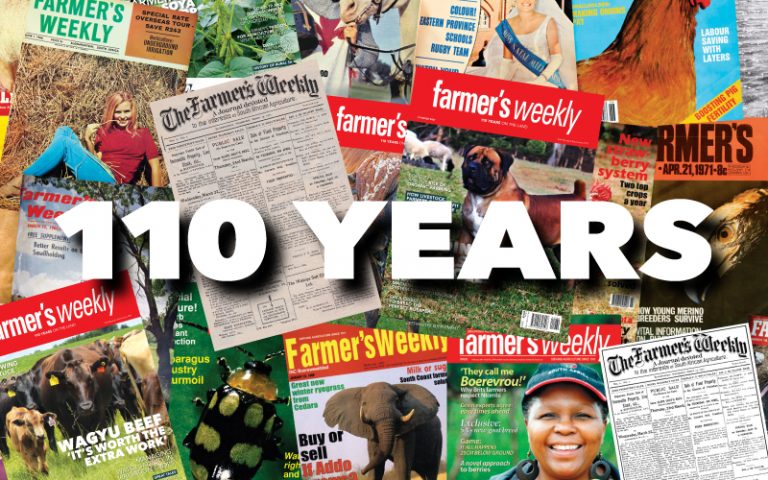
Some of the main challenges facing farmers that are reported on in the issue of Farmer’s Weekly I read this morning is the poor-quality of roads, especially in the rural areas, the affordability of farm labour, and the scourge of stock theft.
These are all well-known challenges to farmers. However, what might surprise you is that the issue of Farmer’s Weekly in which these problems are discussed was published in March 1917.
I am not sure if it is a comfort or source of concern to learn that farmers who worked the land more than a century ago were plagued by many of the same troubles that farmers still experience today.
This year, Farmer’s Weekly celebrates its 110th anniversary. And this week, the third week in March, is the commemoration of when the very first issue of Farmer’s Weekly was published on 15 March 1911.
Farmer’s Weekly is the oldest magazine in South Africa. To work for this publication is to be entrusted with an important South African legacy and one that we are proud to carry into the future.
However, as we celebrate this remarkable publishing milestone, we are also taking time to reflect on the past. We are busy working on a 110th anniversary issue of Farmer’s Weekly, which will be on shelf by the end of April.
Instead of just looking at the history of the magazine, we are looking at the history of farming in South Africa, as told by Farmer’s Weekly.
In many respects, the history of farming in South Africa is the history of all of South Africa. As you can imagine, reading about farming in South Africa over the past 110 years can be, at times, uncomfortable and deeply unsettling.
As far back as 1911, for example, the seeds of ideas were being sown that would later find expression in laws such as the Natives Land Act of 1913, which begun the official separation of white and black people in South Africa, and later the Bantu Education Act of 1953, which officially brought segregation to education.
But there are also other parts to the story that can perhaps teach us a lot about how we should be responding to current-day matters. Certainly, when it comes to issues of land and farmer development, we are at a place now where we have been before.
Black farmers who are now trying to establish themselves in this industry are asking for support from government in the form of input subsidies, the development of rural infrastructure, market access and access to funding.
Compare this with the needs of white settler farmers in 1911: “Let the government, if they are really in earnest [about bringing more people on the land] see what can be done to keep people on the farms. If they want honestly to ‘proceed with a great agricultural policy,’ let them give attention to some of the pressing wants of the farmer, such as assisting them to get fencing material as cheap and as good as possible, see that first-class bulls […] are placed within reach of farmers who cannot afford to pay hundreds of pounds for such animals. Let them make roads, so that people can bring their produce to market […]. Let them bring schools to the door of the farmer […]. Let there be land banks, and see that deserving farmers are placed in a position to raise capital to develop their farms at a reasonable rate of interest.” – FW, 11 October 1911.
See, it has always been difficult to start a farming business in this drought-prone country of ours. The new, white settler farmers of more than a century ago required exactly the same assistance than that required now by new, black farmers.
Even the debate about land reform and land ownership is, in part, repeating itself, and many of the issues that were discussed in the early 1900s, such as the leasing of land versus ownership and what to do with underutilised land held by private owners, are now again finding their way into the debates around the Expropriation Bill of 2020.
Back in 1911 when, under the Agricultural Development Bill, the Land Board selected farmers who would be placed on land purchased by the state, there were ongoing debates about whether the farmers should be given 99-year leases for the land, or if they should be given the option of purchasing the land.
There was also a call for any land held for speculation value by “absentee owners” to be charged an absentee land tax.
One commentator wrote in an article from October 1911: “I think [the absentee land owner] should be made to pay, and so severely that it would be impossible for him to hold land under these conditions.”
In this same issue from October 1911, another contributor wrote: “South Africa is a country of surprises and the man who provides for the unexpected is most likely to come out on top.”
If we consider our history, perhaps the most surprising thing about South Africa is the great similarities that exist between the past and the present in a country that has spent much of the last century preoccupied with the differences between its people.
Share your fondest memories of Farmer’s Weekly on social media by using the #110YearsOnTheLand.











